An Ecosystem for Exploration: The Legacy of HWW’s Career Diversity Workshop
Workshop Alums Reflect on Experiences
About the workshop
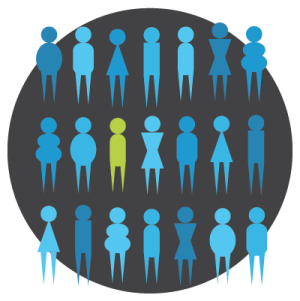
The Humanities Without Walls (HWW) Career Diversity summer workshop, held annually from 2015 to 2023, was a multi-week, interactive experience for PhD students in the humanities and humanistic social sciences who were interested in exploring careers beyond the tenure track. The inaugural workshop was held in Chicago with programming support from the Chicago Humanities Festival, and in 2021, the workshop programming resumed virtually—after a break in 2020—in response to the COVID-19 pandemic.
In 2017, the workshop welcomed its first national cohort of Fellows, which included participants from non-consortial partner institutions. For the next seven years of the workshop, the Fellows cohort roster was sourced from a national call (apart from 2018). The HWW Fellows alumni base numbers in the hundreds and extends across the United States and the world. Within this diverse community of humanists, there are people working in tenure and non-tenure track jobs at colleges and universities, working in hybrid, remote, and in-person roles for-profit corporations and non-profit organizations, and others carving out careers in freelance and consultancy spaces.
Following the second renewal of the grant, Humanities Without Walls administrators re-conceptualized how the core research methodologies of reciprocity and redistribution functioned within the workshop’s framework. A collective decision was made to invite HWW consortial institutions to host the workshop for the remainder of the grant, with additional guidance and support from the HWW career diversity team. In 2022 and 2023, the University of Michigan and the University of Minnesota hosted workshops, respectively, providing distinctive experiences for the Fellows, including resources that were uniquely bound to space and place, while honoring the call of “humanities without walls.”
We spoke with HWW Fellows from the 2016, 2018, 2019, and 2021 cohorts about their experiences with the workshop and the enduring legacy of this program.
Creating an ‘ecosystem’ of options
“I didn’t really know much about academia as a first-gen college student,” said Kai Harris, 2019 Fellow, author of What the Fireflies Knew (Random House) and Assistant Professor of Creative Writing in the Department of English at Santa Clara University. “The HWW workshop was the first time where I felt like people were actively talking to me about all the things that I could do after I graduated. I was surprised by how much I got out of the other experiences that I thought were not applicable to me. There were a lot of options.”
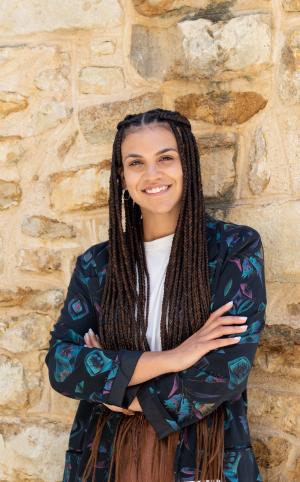
Michelle May-Curry was also interested in exploring her options. A 2018 Fellow, May-Curry was pursuing her PhD in American Culture from the University of Michigan when she applied to be part of the workshop experience. She currently works as a curator and grants administrator for the D.C. Commission on the Arts and Humanities, following a multi-year stint as the project director for Humanities for All, a Mellon-supported initiative of the National Humanities Alliance.
“I realized around the end of my second year [of my doctoral program] that teaching wasn't the thing that was going to scratch the itch for me,” May-Curry reflected. “I started actively pursuing career diversity opportunities. I was mostly putting my eggs in the academic basket.”
The workshop offered May-Curry—and other Fellows—an “agnostic,” non-judgmental approach to exploring career options both within and beyond the academy. Members of the fellowship cohort were invited to practice values-based discernment when contemplating all the facets that could comprise their career path. After the workshop ended, May-Curry was a fellow at the Carr Center, a Black arts organization in Detroit. She began to “relinquish the identity of being an academic” and started to self-identify as a writer, a curator, and a creative.
“The workshop created an ecosystem,” May-Curry maintained. “It created a more expansive view of what’s possible for graduates. There is a real culture shift that was created through HWW.”
This shift is something that Linda García Merchant, 2016 Fellow and public humanities data librarian at MD Anderson Libraries at the University of Houston, also felt. In our conversation, García Merchant mentioned the Crossing Latinidades Humanities Initiative, a “necessary legacy” of the HWW initiative that is currently being implemented at the University of Illinois Chicago. In her current role, García Merchant is charged with developing a set of resources to support digital work in the humanities, a role that involves shaping infrastructure, training, and programming on a larger scale. As a filmmaker, activist, librarian, and humanist and Chicagoan, García Merchant taps into a distinct skill set: hearing discrete needs across disciplines, a practice that was rekindled through her HWW workshop experience.
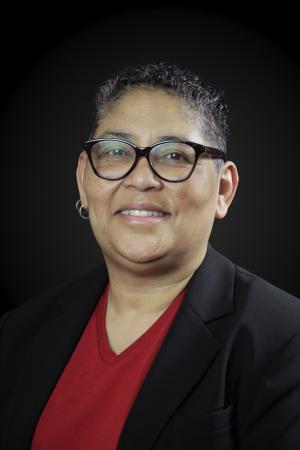
“I don’t think we do enough [career discernment] in graduate school,” García Merchant said. “I am really glad HWW existed…because you made these institutions aware that they need to do more to help graduate students in terms of professional development.”
García Merchant remains hopeful that this type of incisive work, this interrogation of both self and institutions, can happen in multiple spaces—not just within the confines of an R1 research university, but also at private schools, smaller schools, regional schools, HBCUs, and other institutions. Until then, she continues “unexpected” work she started during the HWW workshop: using her network to foster connections and helping others see the diverse, interesting paths available to them.
May-Curry also continues to shift the culture at Georgetown University. As a member of the core faculty for the Engaged Public Humanities master’s degree program, she teaches two classes, “Humanities in the World” and their internship requirement course, which May-Curry affectionately calls a “mini HWW.” These courses embody much of what May-Curry learned in HWW, and they're all things that she did not get in the classroom in her graduate education. True to form, topics and activities that are traditionally considered extracurricular are a core part of May-Curry’s curricular and pedagogical approach.
“The first hour is readings, the second hour is an invited guest speaker, and then the third half hour is a professional development exercise of some sort. That is the playbook right there. Thanks, HWW, for the help with my syllabus!”
Existing in collaborative community
An interlude from the regular functions of life as a graduate student, the Career Diversity workshop also provided that necessary third space, one outside of departmental and university affiliations. Individual cohort members showed up as themselves and they could ask other Fellows about their lived experiences at their campuses, their processes for applying to other grants and fellowships and jobs, their hopes, their dreams. They were also implicitly asking a more complicated question: how did other Fellows continue to persist within structural systems that were not constructed with them in mind? In more explicit terms: who were they and how did they live?
“What stands out to me about the workshop is the people that I met, and the connections that we made,” Harris emphasized. “We had an extremely diverse group in 2019, and it was a lot of women of color. That was important to me because in my graduate school program at Western Michigan University, at the time, I was the only Black woman in my program. It was cool to me to work with people who I felt like I had commonalities with.”
During the workshop, the Fellows lived together in community. They laughed, cried, and bonded over their experiences in academia. All the Fellows we interviewed praised the cohort aspect of the workshop, deeming it central to their respective experiences—some even remarked that the relationships built, at times, outweighed the overall impact of the workshop sessions. Whether they came from programs that offered tangible resources and support or not, each Fellow found that support in their conversations with each other.
“My cohort experience was amazing,” May-Curry said. “Coming out of the University of Michigan, there's already such a culture of camaraderie between grad students, especially in the humanities. And I felt the same way about the HWW experience immediately. I felt like all these people were in it too. They all had the same questions as me.”
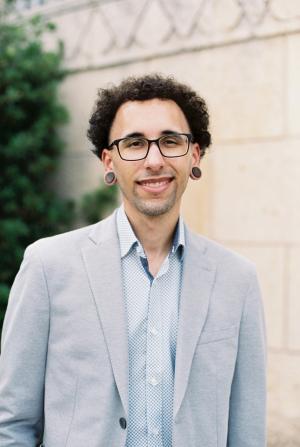
Brandon Render, 2021 Fellow and assistant professor in the department of History at the University of Utah, noted that the HWW network offers up a “sustained sense of community,” a rarity in academic spaces. For all the Fellows, this HWW community continued after the workshop ended: keeping up with their cohort’s accomplishments virtually, staging in-person meetups in their cities, and taking comfort in the knowledge that they were part of the Humanities Without Walls extended universe.
Inviting others to explore
“It felt like everything during the HWW workshop came back to being a good mentor: being a good mentor for yourself, but then also finding good mentors from different people in different career fields that [could serve as] informal or indirect mentors,” said Render.
He willingly serves in both formal and informal mentorship roles for students at Utah. Render believes in using his experiences with the HWW workshop to model and implement lessons learned during his time as a Fellow. In addition to his service, research, and teaching commitments, he often helps students with senior thesis projects or community engagement initiatives or is a sounding board for students during walk-in office hours.
Render uses his own experiences as an example for his students, often having them guess what his major was initially in undergrad before he settled on History. (It was accountancy). After being part of the HWW workshop experience, Render gained confidence in his ability to think about the field of career diversity in a practical sense—and to share these ideas with students pursuing all types of ideas.
“I'm much more able to reach out to students who aren't history majors now because I can talk about different careers outside of just academia or what particular history majors might be interested in, but what you can do with the humanities degree,” Render reflected.
Being open to ambiguity
During the HWW workshop, the Fellows engaged in self-reflective exercises, learned alongside panelists and guest speakers, and when possible, attended site visits for local institutions, businesses, and non-profit organizations. All the workshop sessions offered, in one form or another, an opportunity for Fellows to think again—about their lives, their careers, and the dreams they want to pursue, dreams that can exist tangentially and parallel to their work.
While Render’s HWW experience was entirely online, it also offered up the ability to reconsider both his own trajectory and those of other humanists. He began contemplating how an individual’s background influences the ways they think about and approach research. These ideas merge in Colorblind University, Render’s latest writing project, which places the most recent Supreme Court case against race-based affirmative action in historical context, while also describing how the concept of color blindness developed in the cultural vernacular and infiltrated admissions policies, departmental structures, and curriculum design.
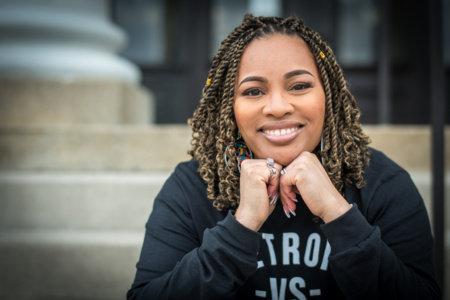
Holding ambiguous and emerging ideas about oneself and one’s work is another clear byproduct of the workshop experience, one that also resonated with Kai Harris.
One of the things Harris loves, unequivocally, is her job teaching creative writing as a professor at Santa Clara. Prior to attending the HWW workshop, she actively did not pursue a career in the professoriate; it was something that she did not realize that she could strive for. In the years following her workshop experience, Harris did become a tenure-track professor, but she will be the first to tell you that is not her most important role or identity. The value of her work, however, speaks for itself: at a rich, predominantly white school in the Silicon Valley, Harris teaches creative writing and has students engaging in coming-of-age stories through the lens of Black women writers.
“It was really empowering for me to be in a non-Black space and to still center Blackness in that way and to have it received so wonderfully…exposing my students to what I know to be true, which is: stories about Black girlhood are universal stories just like any other story could be a universal story,” Harris shared. “A thing that I was nervous about ended up being something that was really meaningful and enjoyable to me.”
In retrospect, Harris recognized that not all sessions during the HWW workshop were going to apply directly to her life and career. However, it gave her the chance to bet on herself and to be aware of her options moving forward.
“I had to realize that everything here is not going to be my thing, but something here is going to speak to me and I just need to be ready and open for whatever that thing is. And I feel like that's what happened,” Harris mused. “I didn't leave there saying, ‘Alright, I know 100 percent what my career path is and what I'm going to do next.’ But I did leave there feeling very confident that I was going to get a job after graduation, something that I love.”
May-Curry felt the same way.
“With HWW coming to a close, creating a career that is in line with your values is now something that people are encouraged to do,” she said. “HWW gave me language, it gave me tools, and it made me happy. It was a joyful experience.”
---------
From 2015 to 2023, nearly 230 humanists participated in the Humanities Without Walls Career Diversity Workshop. As Fellows, they are the living legacy of this initiative.
Related stories:
“We Need Humanists Everywhere”: Minnesota Team on Building the 2023 HWW Career Diversity Workshop